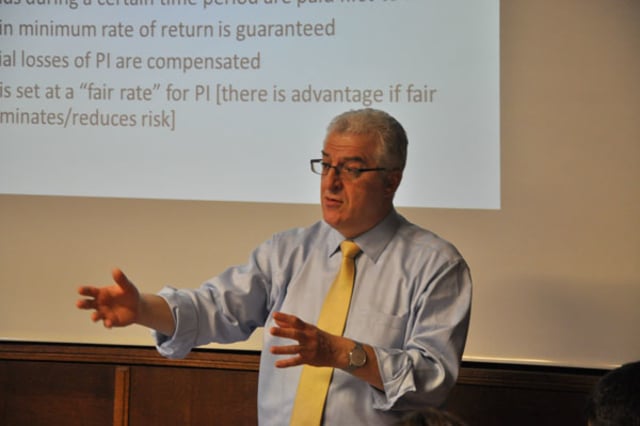National courts may not question Commission decisions but they may ask the Court of Justice for guidance on how to interpret Commission decisions. Protection of shareholders of a particular category of companies is a selective measure. Introduction This is the last article dealing with the judgments that were rendered by EU courts on 21 December 2016. This article reviews the reply […]
State Aid Law
Blog
State Aid Uncovered Blog
In Lexxion’s State Aid Uncovered blog, Prof. Phedon Nicolaides publishes weekly critical analyses of recent State aid judgments and decisions. Each post presents the key points of a court judgment or EU Commission decision, places it in the context of similar case law or practice, assesses the underlying reasoning and highlights any inconsistencies or contradictions.
Guest contributions from other State aid experts will also be published on the blog at irregular intervals to complement the content of the blog posts.
24. January 2017 |
by Phedon Nicolaides
Derogations that result in different tax treatment are selective measures. Introduction On 21 December 2016, the Commission achieved an important legal victory when the Court of Justice found in its favour in the judgment in joint cases C‑20/15 P and C‑21/15 P, Commission v World Duty Free Group [formerly Autogrill España] and Commission v Banco Santander, respectively.[1] The Commission appealed […]
17. January 2017 |
State Aid Uncovered
by Phedon Nicolaides
The advantage conferred by State aid is not necessarily equivalent to the economic benefit that is eventually enjoyed by aid recipients. Incompatible State aid has to be repaid regardless of whether it is passed on to the customers of the aid recipients. Undertakings derive an advantage when state intervention reduces the costs they would bear under “normal market conditions” whereby […]
10. January 2017 |
State Aid Uncovered
by Phedon Nicolaides
The advantage conferred by State aid is not necessarily equivalent to the economic benefit that is eventually enjoyed by aid recipients. Incompatible State aid has to be repaid regardless of whether it is passed on to the customers of the aid recipients. Undertakings derive an advantage when state intervention reduces the costs they would bear under “normal market conditions” whereby […]
3. January 2017 |
State Aid Uncovered
by Phedon Nicolaides
Providers of public services must keep separate accounts. The parameters for calculating the compensation for the extra costs of public services must be determined in advance. Awards for damages do not constitute State aid. However, no damages can be awarded as a substitute for incompatible State aid. Introduction It is often asked how compensation measures for public service obligations […]
29. December 2016 |
Guest State Aid Blog
by Lexxion Publisher
From remarks on the Commission Notice on the Notion of State aid over to the right of access and State aid procedures, our guest bloggers on the StateAidHub have shed light on various controversial State aid judgments and developments. View now the most popular posts of 2016. With the end of 2016, we thank not only Prof Phedon Nicolaides […]
27. December 2016 |
State Aid Uncovered
by Phedon Nicolaides
Tax payers have grounds to object to a tax on the basis of Article 107(1) TFEU only when the tax is “asymmetrical” or when it is “hypothecated” to an aid measure. Introduction On 10 November 2016, the Court of Justice ruled in case C‑449/14 P, DTS v European Commission.[1] DTS, a Spanish television company, appealed against the judgment of the General […]
22. December 2016 |
State Aid Uncovered
by Lexxion Publisher
Questions around selectivity of tax measures, the private creditor test, the new Commission Notice on the Notion of State Aid and many more have moved and shaped this year’s judgments on State aid. See which articles by Prof. Phedon Nicolaides were the most popular ones in 2016. We have also started an exciting new journey of State aid videos on […]
20. December 2016 |
State Aid Uncovered
by Phedon Nicolaides
Modification of an existing aid measure turns it into a new aid measure if it affects its compatibility with the internal market. National courts must also notify to the Commission any new aid measure they detect. Introduction On 26 October 2016, the Court of Justice ruled in case C‑590/14 P, DEI v Commission.[1] DEI, the incumbent electricity producer in Greece appealed against […]
15. December 2016 |
Guest State Aid Blog
by Dimitrios Kyriazis
The following is a summary of the main points that were presented and the issues that were discussed in the seminar on State Aid in Tax Measures that was held by Lexxion in Brussels on 7-8 November 2016. The summary has been prepared for information purposes only and it is not meant to be a precise record of the proceedings […]
7. June 2016 |
State Aid Uncovered
by Phedon Nicolaides
Aid measures that target persons with particular needs and who are not adequately provided by the market are not likely to be found to distort competition contrary to the common interest, even if there is some substitutability between the subsidised services and similar services provided by the market on commercial terms. Introduction In August 2011, the Commission received a […]
31. May 2016 |
State Aid Uncovered
by Phedon Nicolaides
Arrangements established by law whereby undertakings are compensated for any extra payments they make to producers of green electricity are likely to bring those payments under the control of the state. Those payments will then be classified as state resources regardless of whether they are managed by private entities. Introduction On 10 May 2016, the General Court issued its […]
24. May 2016 |
State Aid Uncovered
by Phedon Nicolaides
State aid is an objective concept. When the Commission assesses a measure it has to examine its effects and cannot be bound by a decision of the Council. A beneficiary of State aid cannot entertain legitimate expectations simply because the Commission does not appear to object to the aid. Introduction On 22 April 2016, the General Court rendered its judgment […]
18. May 2016 |
State Aid Uncovered
by Phedon Nicolaides
A market economy operator undertakes activities whose incremental revenue exceeds their incremental costs. A market economy operator ignores costs which are unaffected by those activities. A service of general economic interest has special characteristics that set it apart from other services with positive impact on the economy. Having a positive impact is not enough. Part II: Public tasks and […]
10. May 2016 |
State Aid Uncovered
by Phedon Nicolaides
A market economy operator undertakes activities whose incremental revenue exceeds their incremental costs. A market economy operator ignores costs which are unaffected by those activities. A service of general economic interest has special characteristics that set it apart from other services with positive impact on the economy. Having a positive impact is not enough. Introduction National and regional authorities […]
3. May 2016 |
State Aid Uncovered
by Phedon Nicolaides
State guarantees can be used to support loans for working capital. The amount of State aid in guarantees can be calculated to remain below the de minimis threshold of EUR 200,000. Introduction With financial instruments being very much in vogue, there is much interest in the use of guarantees and loans as a means of granting State aid. Therefore, […]
18. April 2016 |
State Aid Uncovered
by Phedon Nicolaides
Bank resolution may involve State aid. However, the depositors do not normally benefit from State aid, nor do the buyers of the viable assets, if they pay a market price. Any aid normally goes to the remaining, non-performing, assets that are eventually liquidated. Introduction The new bank resolution regime that came into force on 1 January 2016 aims to […]
12. April 2016 |
State Aid Uncovered
by Phedon Nicolaides
A private investor always takes into account all available information before it makes any investment. Similarly, a private creditor takes into account all available options for recovering the largest possible amount of the money that is due. Such options may include different legal procedures. In assessing alternative options, a private creditor considers not only the amount that may be recovered, […]
5. April 2016 |
State Aid Uncovered
by Phedon Nicolaides
Public funding of local infrastructure is not State aid when the responsibility for the infrastructure falls within the remit of public authorities, it is not commercially exploited, it is open to all users, it is not intended to support the needs of any particular undertaking and any benefits to any undertaking are incidental. Introduction Even since the adoption of […]
30. March 2016 |
State Aid Uncovered
by Phedon Nicolaides
Public funding of advisory and information activities may constitute State aid. Public funding of industry associations may constitute State aid. Introduction An article that was published on this blog in January (view the article HERE) dealt with the issue of compulsory tests. If tests which are intended to safeguard public health are paid for by the state, is there any […]























